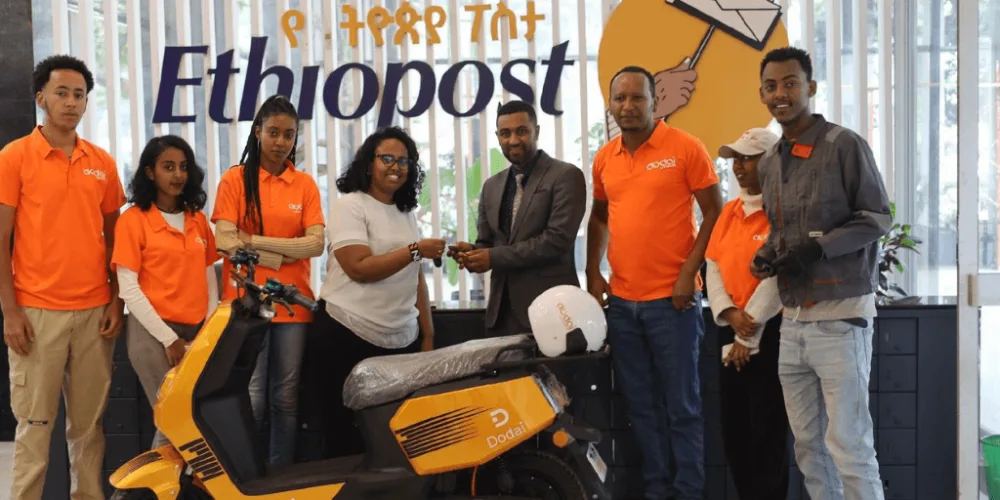In a groundbreaking development for Ethiopia’s burgeoning electric vehicle (EV) sector, Dodai, an innovative EV manufacturer, has secured a significant $4 million in Series A funding. This financial boost is set to propel the company’s growth and aligns with the Ethiopian government’s ambitious green initiatives.
The recent capital infusion by Nissay Capital, Musashi Seimitsu, and Inclusion Japan, which is leading Dodai, marks a turning point for the Addis Abeba-based startup. With 80% of the funds earmarked for importing crucial electric motorcycle parts and lithium batteries, Dodai is gearing up for a major scale-up. The remaining 20% will fuel operational expenses and software development, with an eye on launching a battery-swapping system by the end of 2024.
Read also: Huawei, Xiaomi’s EV success may influence Apple
A National Drive Towards Sustainability
The timing of Dodai’s funding success is particularly noteworthy, coinciding with the Ethiopian government’s rigorous push towards a greener future. The nation’s bold move to ban fuel-powered vehicles underscores its commitment to environmental sustainability and positions Dodai at the forefront of this transformative journey.
Since its inception in 2023, Dodai has raised an impressive $6.2 million, with the latest funding round being the largest for an Ethiopian startup to date. The company’s electric motorcycles, renowned for their 150 km range per charge and eight-year battery lifespan, are a testament to Dodai’s commitment to quality and sustainability.
weVenture: Catalyzing Early-Stage Startups
Complementing Dodai’s achievements, weVenture, Ethiopia’s first VC-backed incubator, is set to invigorate the startup ecosystem. By providing crucial support to early-stage ventures, weVenture aims to amplify the impact of innovative solutions across the nation.
Musashi Seimitsu’s collaboration with Dodai extends beyond mere investment. As a strategic partner, the Japanese automotive parts supplier is keen on addressing regional mobility challenges and expanding its e-mobility footprint in Africa. Future joint endeavours include developing EV scooters equipped with Musashi’s e-Axle, launching three-wheeled vehicle products, and engaging in data collaboration.
Ethiopia’s Green Transport Vision
Underpinning these corporate milestones is Ethiopia’s comprehensive Logistics Master Plan, which envisions a “Green Transport” future for the nation. Spearheaded by Transport and Logistics Minister Alemu Sime, the plan includes stringent smoke tests for fossil fuel-powered vehicles and the establishment of extensive EV charging infrastructure. Additionally, the government has introduced tax exemptions for electric cars, further incentivizing the shift to eco-friendly transportation.
Dodai’s Series A Funding is more than a financial win; it’s a symbol of Ethiopia’s steadfast resolve to embrace green mobility. As the nation gears up for an electric future, Dodai’s role in shaping this new era of transportation is becoming increasingly clear. With the government’s supportive policies and the strategic partnerships in play, Ethiopia is well on its way to becoming a model of sustainable transport in Africa.
Read also: BasiGo launches Kenya’s first public EV charging station
The current state of EV adoption in Ethiopia
Ethiopia is emerging as a leader in the adoption of electric vehicles (EVs) in Africa. The government has taken significant steps to encourage the use of EVs, including removing them from value-added tax (VAT), excise, and surtaxes. Additionally, import duties for EVs have been reduced to 15% for completely built units and 5% for semi-built units.
A national electric vehicle promotion drive has been launched, aiming to create a carbon emission-free transport system. This includes plans to introduce 4,800 electric buses and 148,000 electric automobiles as part of the country’s ten-year strategic plan.
These initiatives, coupled with the expected electricity supplies from the Grand Ethiopian Renaissance Dam project, position Ethiopia to make a swift transition to electric vehicles over a short period, despite challenges such as regional conflicts and water access concerns.














